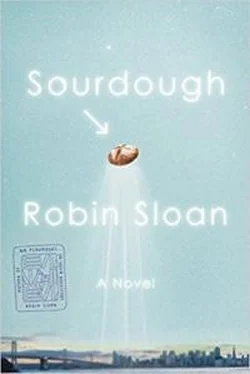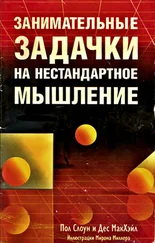The book’s introduction ran for twenty-two pages. It was a baker’s bildungsroman, chronicling Broom’s youth in Sacramento, his visits to his grandfather’s bakery, his flameout as a professional skateboarder, his addiction to a home-cooked drug known as spaz rocks, and finally his retreat to a bread-baking shack on the beach and his reformation there. There were photos, all monochrome: a young man with a thick black beard below a face so clean and cherubic it made the beard appear glued on. In a photo spread across two pages, he leaned against a homemade brick oven, for which the adjective rustic was a favor; it looked like a pile of rubble. Scattered in the foreground were various signifiers of bohemian tranquility: a guitar, a surfboard, a book with VOLTAIRE on the spine.
He was out there learning, in his words, “to bake without dry yeast, without desiccation, without death.” Well, sure. Nobody wants death bread. Instead, he sought the alchemy of sourdough: “Wet, living, fragile, sensual. The funk of life. I smelled it on the beach, and in the forest glades where I gathered mushrooms, and in the embrace of Lucia, who was at that time my lover. And I smelled it in my starter, too.”
After twenty-two pages of funk versus death, the painstaking construction from found materials of his oven, the hollow of Lucia’s clavicle, et cetera, Broom figured it out. A photo showed a very young man with a very large beard grinning manically into the camera, hoisting a loaf of bread in the air like a trophy. The loaf was as big around as his chest, and, to be fair, it looked totally awesome.
He came to San Francisco, where he opened Boulangerie Broom—now a chain with three locations—and wrote this book. He shaved his beard and traded the shack for a house in Noe Valley. He married a product manager named Olivia and had two kids.
End of introduction. Next, Broom got down to business.
Sourdough bread begins with sourdough starter, which is not merely living but seething. It is a community of organisms comprised of, at minimum, yeast, which is a fungus, and lactobacillus, a bacteria. They eat flour—its sugars—and poop out acid—thus, sour—in addition to carbon dioxide, which, trapped by stretchy, glutenous dough, gives the bread an airy structure, the so-called crumb, at its prettiest a dazzling network of gaps and chambers.
Broom’s first chapter described the capture and cultivation of a wild sourdough starter, a process that could take a week or more. I already possessed the Clement Street starter, so I skipped ahead.
Broom lamented the fact that we, his readers, could not bake with the benefit of a beachside shack or a rough-hewn brick oven or an Argentine lover. But he said we could still make a pretty good attempt at it, and he listed the equipment we would need:
• A digital scale, to weigh the ingredients
• A bench knife, to scrape and divide the dough
• A bread blade, to score the loaf (with a baker’s mark that, ideally, matched our wrist tattoo)
• A baking stone, to absorb and emit heat in a loose simulation of Broom’s brick oven (though he counseled that there was, in fact, no substitute and that, basically, he pitied us)
I opened my laptop, called up the website of an expedient internet retailer, and pecked in the name of the scale—the precise brand and model that Broom recommended. The site immediately responded: CUSTOMERS WHO BOUGHT THIS ITEM ALSO BOUGHT … followed by the bench knife. And the bread blade. The baking stone. King Arthur flour and Diamond Crystal salt, just as Everett Broom recommended. And finally, Broom’s book itself.
The internet: always proving that you’re not quite as special as you suspected.
Two days later, a UPS driver delivered the tools and ingredients to my apartment. She also delivered one apron that I had purchased from a different internet retailer, a craftier one. The apron was squarish, made from heavy denim. It looked like something a blacksmith might wear. It was the first apron I’d ever owned. I loved it.
I set out my tools. I donned my apron. Everything was in order, and I was ready to produce a beautiful, burnished loaf just like Broom’s on the cover of his book.
There were detailed instructions. I love detailed instructions. My whole career was detailed instructions. Precisely specified actions, executed in order. A serene confidence settled over me.
I mixed the ingredients together, and immediately the project collapsed into chaos and disaster.
Where the bread book showed a lump of dough folded elegantly into itself, I looked upon a twisted mutant mass.
Where the bread book showed Everett Broom’s clean fingers deftly maneuvering said lump, my hands soon wore thick gauntlets of glop. I waved them over the sink, tried to shake some of it loose.
Where the bread book showed a rustic work surface smartly maintained, I looked upon a cramped and dingy countertop filmed with slime.
There was dough on the cupboards. Dough on the faucet. Dough on the floor. It looked like the scene of a glutenous murder committed by a careless killer.
With each step, reality diverged further from the shining ideal pictured in the bread book, and by the end of it, I wasn’t even following Broom’s directions anymore, just doing whatever I could to keep the dough in one piece. It was too wet, so I added flour, then it was too dry, so I added water, and it became gloppy again, so more flour was required, and the dough grew and grew, bloblike.
There was a malevolence to it. It was not on my side.
Broom’s directions indicated that it was now time to retreat while the starter did its work to make the loaf ferment and rise, and I did this gratefully. I washed my hands, tore off the apron, set the oven to preheat, opened an Anchor Steam, and flopped down in my living room. I found my laptop and set Chaiman’s CD to playing. I knew every song. I’d heard them all, waiting on hold night after night.
When the timer beeped, I discovered that the dough had indeed expanded in size, and it had also firmed up somewhat. Its skin was soft but not gloppy. Glossy. I quickly folded it over onto itself, opened the oven—which was really very hot inside; was this safe? Were you truly supposed to set the temperature this high?—and dropped it onto the baking stone. Then I pushed the oven’s rack back into place and slammed the door, just as a warden might slam the door on a prisoner, supremely evil and objectively irredeemable, banishing him to solitary confinement forever.
I set the oven’s timer, opened another Anchor Steam, and played Chaiman’s CD again. It had seven tracks, each almost ten minutes long. The music of the Mazg was entirely a cappella—a tight cluster of voices. Their language sounded Slavic, but every so often there was a hard stop, like the hitch of a sob, or an ear-bending slide between notes that spun the sound into some other, more distant dimension.
I wondered if the brothers had arrived at their destination. I thought about emailing Beoreg, but I didn’t know what I would say. Our relationship had been constrained entirely by the menu. If not “Double spicy, please,” then what?
* * *
FORTY MINUTES, four songs, and three beers later, the timer beeped. I opened the oven door and pulled out the rack to assess the damage.
Against all odds, the malevolent loaf emerged from the oven round and buoyant, its crust split by deep fissures. It was perhaps not as perfectly photogenic as the one on the cover of the bread book, but it was … not too bad.
In my exasperation, I had skipped one of Broom’s steps, the one where he exhorted you to carve a baker’s mark, some symbol of your own choosing. (His mark was a heart with an X through it, which was also the logo of Boulangerie Broom, seen on T-shirts and tote bags throughout San Francisco.) I had not signed my sloppy work, but there was nevertheless a clearly defined shape in the cracks and whorls of the crust.
Читать дальше










